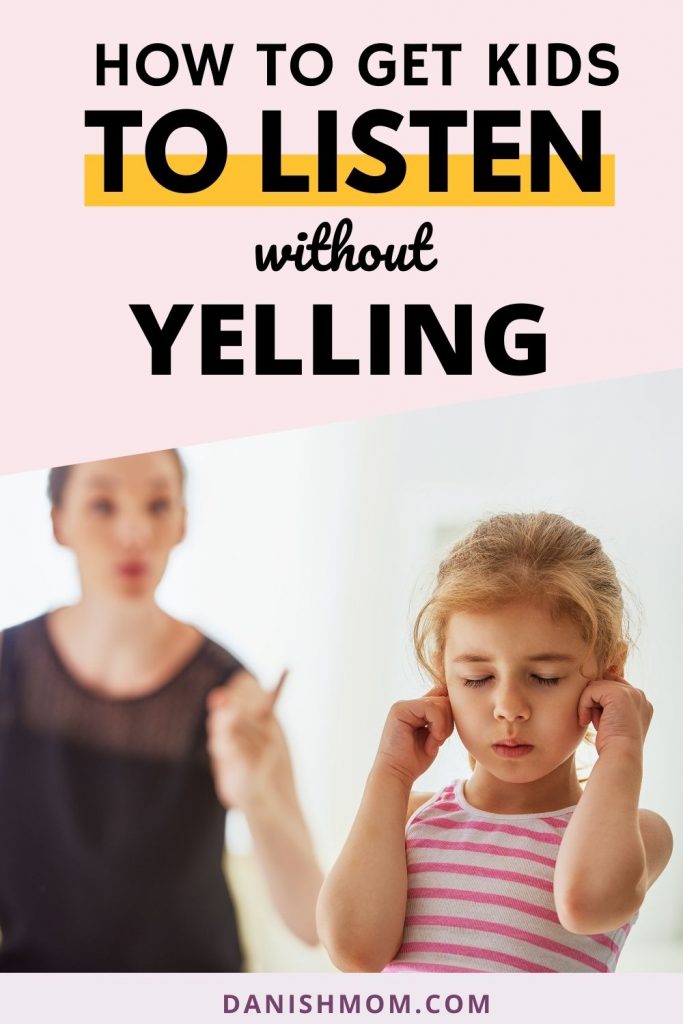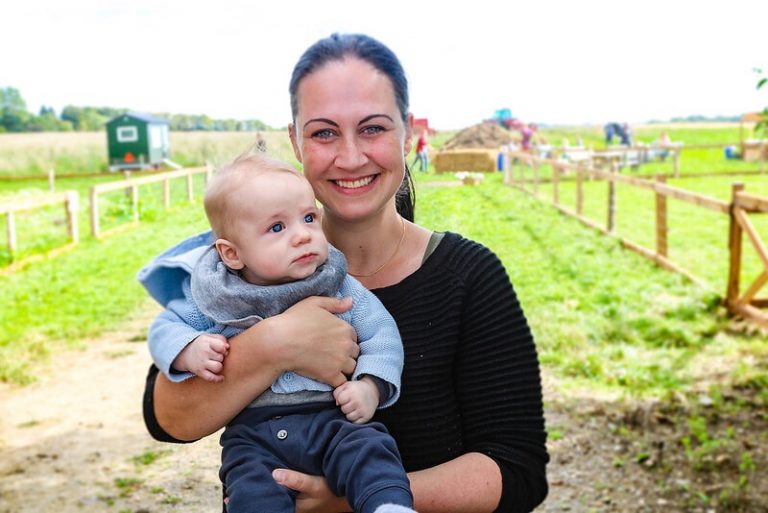How to get kids to listen without yelling

Is there anything more frustrating than asking your child to do something (for the 10th time) with no response?
I can’t think of anything.
If you’re wondering how to get kids to listen without yelling, you’re not the only one.
Kids not listening is one of the most common parenting complaints I hear from fellow moms and dads. It can make you feel like a bad parent, and make you embarrassed to bring your child to the store or other people’s homes because you never know if things will go wrong.
Read next: Why kids don’t listen – and what to do about it to learn the most important reason why kids don’t listen, focus or sit still.
Maybe your child runs away and refuses to come when you call. It’s understandable when they’re 1,5 or 2 years old, but when your child is 3 or more, you might feel that other people judge you. Some might even make a rude comment.
I know it’s not easy. Especially if your child has gotten used to not listening. Then it’s like with so many other skills – it needs to be trained.
At the end of the day, we can’t force our kids to listen. But we can do several things to increase the possibility that they will.
This post contains referral links for products I love. Danish Mom earns a small commission at no extra cost to you if you make a purchase through my links. Thank you for your support ♡
Table of Contents
Does this sound familiar?
You in a calm, loving tone: “Boys, dinner is ready”
No answer. But you hear them tumbling in the playroom.
You try again. This time a little higher: “Booooys? Let’s eat before dinner gets cold.”
Crickets.
You hear them laughing as if you didn’t exist.
“BOOOYS!” Now you’re angry as you storm into their room: “Get in the kitchen. NOW!”
When your kids won’t listen, you feel disrespected, frustrated, and more than anything: you feel powerless.
So, you yell to gain power.
And while it does – very briefly – make you feel in control, you won’t get the reaction you need: that your kids actually listen.
Why yelling doesn’t work
Think about it, how would you feel if someone yelled at you? Scared? Mad? Upset? It’s not a great experience, right?
That’s because if we get yelled at, the brain triggers a threat response, and then it becomes even harder for us to listen.
Yep. It’s scientifically proven.
Psychologists have shown that when the Amygdala, as the center of the brain is called, flashes an alarm, it leads to a racing heart, rapid breathing, muscle tension, fear, and anxiety. And then our ability to think clearly, find solutions and regulate our emotions, is reduced.
Put simply: When we yell, kids become scared or angry. And then they have a much harder time listening.
What to do instead
In Nordic parenting, we approach conflicts with connection.
We put ourselves in our kids’ shoes and show them the same level of respect and patience as we would with a colleague or friend. So, if we stay on the example with eating, I’d do like this:
I tell my son to come eat. If he doesn’t listen, I go to him and tell him dinner’s ready. I wait till he comes.
If he doesn’t want to come, I go to him; sit in front of him, or put my arm around him. It’s difficult to ignore someone right in your face. And then I tell him to come with me in a firm, friendly tone.
I have several ways to get him to listen, depending on the situation. And they work. He usually listens the first time we ask him to do something.
My son isn’t an angel and we’re not perfect parents (I loose my cool, too, sometimes). But this approach is simply the best to get kids to listen AND establish a real connection while you’re at it.
Here’s how you can do it, too ↓
Read next: 20 tips you can learn from Scandinavian parents

How to get kids to listen without yelling
1. Say what they can do
When I need my son to do something and he doesn’t want to, I reframe.
It’s a very effective Danish parenting method that means you shift focus from what they can’t to what they can do.
So, for instance, if we’re at the store and my son wants that super cool new Spiderman and keeps asking, I’ll say: “You can’t have that one. BUT once we get home, we can put it on your birthday or Christmas wishlist. Do you want to help me make a wishlist with the FUN toys you want?”
It works every time.
2. Distract
I often joke that my secret parenting weapon is to distract. It’s funny because it’s so obvious what you’re doing, but kids don’t see it (and don’t care). And that’s what makes it so effective.
The key is simply to distract your child whenever they have a meltdown or won’t listen.
So, for example, if my toddler keeps asking me for ice cream, I subtly change the subject: “You can’t have one now. But if you could, which flavor would you like? or “Would you want a huuuuuge one or one with a gummibear?”
While we’re busy talking about the gigantic imaginary ice cream, he forgets about his immediate need for it. I ended the conversation by saying that we should have one of those ice creams one day.
He’s always content with that because he knows I keep my promises.
3. Avoid or remove the problem
Removing the problem is another simple way how to get toddlers to listen without yelling.
If Theo doesn’t want to pick up his toys, I take the toys and tell him that he can have them back when he’s ready to listen. I do the same at the store.
If he keeps having a meltdown while we’re shopping, I don’t take him with me. I avoid the problem altogether and shop before I pick him up at Kindergarten or leave him with my husband.

4. Turn it around
If you want your child to listen, try to avoid saying what they can’t do. Say what they should do instead.
So, for instance, say “Lift your feet” instead of “Be careful, don’t fall”. Or “We only have one Grace, let’s take good care of her” instead of “Don’t hit Grace”.
You’re focusing on the positive instead of the negative here.
5. Check your posture
Just as words have power so does your body language. These postures come across as hostile so they’re best to avoid:
- Standing over your child when communicating
- Pointing fingers at your children to get a point across when you are angry
- Having your arms crossed
What to do instead: Move an inch closer. Sit or kneel so you have eye-to-eye contact with your child. This way, you’re on the same level, which makes it easier to establish open communication.
6. Acknowledge their feelings
If your child is acting out or won’t listen, talk to them about it. Ask what’s going on, and if they’re too young to put it into words, help them express their feelings.
You can ask: “Are you upset that you can’t play anymore because you have to go to bed?” or “I see you really want that candy. It means a lot to you, huh, hon?”
If they feel understood, they’ll feel like you’re on the same team. That’s how you build a connection between you, and when you have that, they will naturally want to please you. Maybe not every time, but 9 out of 10 times, they will do as you ask.
This, mama, is the key to making your kids listen.

7. Keep it short
To make it easier for your child to listen, keep it short.
No looong explanations about why they can’t stay up or why they need to wear shoes outside.
Kids often stop listening after a few sentences, so make your point, and make it quick. So: “Pick up your toys” or “Put your shoes on” is what you need to say to make them listen.
8. Pick your battles
Think about what’s important to you when raising your kids. Because you can’t have it all (at once).
If your child must learn to wash his hands before dinner, focus on that. Not the four other practical things when you’re about to eat.
Everything should be practiced over and over again, but not at the same time.
Remember, Rome wasn’t built in one day.
More on how to get kids to listen without yelling
- The real reason why kids don’t listen – and what to do about it
- Learn how to only say something once
- Why parents yell – and how to stop
- How to tame your child’s meltdown with one simple word
- How to discipline without punishment
FAQ – How to get kids to listen without yelling
How do you discipline a child without shouting?
To discipline a child without shouting, establish clear rules and consequences, use positive reinforcement, set a good example, and communicate calmly and clearly.
Listen to their perspective, offer choices, and be consistent with rules and consequences.
Why won’t my kid listen unless I yell?
If your kid only listens when you yell, it might be because they’ve learned that’s when you mean business.
To change this, try getting their attention calmly before speaking, being consistent with rules and consequences, and making sure your instructions are clear and age-appropriate.
How do you discipline a child that won’t listen?
Disciplining a child who won’t listen involves staying calm, setting clear expectations, and following through with consistent consequences.
Use positive reinforcement to encourage good behavior, give them choices to empower them, and ensure that your communication is clear and at their level of understanding.
How do I get my 8-year-old to listen without yelling?
To get your 8-year-old to listen without yelling, try these strategies:
- Get down to their level: Make eye contact and gently touch their shoulder to ensure you have their attention.
- Speak calmly and clearly: Use a firm but calm voice to convey your message without shouting.
- Be consistent: Set clear rules and follow through with consequences so they know you’re serious.
- Listen to them: Show that you value their input, which can make them more likely to listen to you.
- Give choices: Instead of commanding, offer options to help them feel more in control.
- Use positive reinforcement: Praise them when they listen well to encourage that behavior.
- Set a good example: Model the listening behavior you want to see in your child.
Save it!






